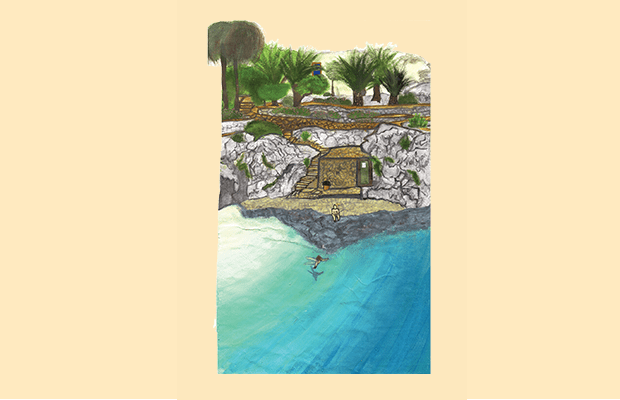As I glared at the television late one Friday night watching My Big Fat Greek Wedding for the 26th time — that shameless tribute to ridiculously chaotic yet lovable Greeks — I didn’t want to believe it. But as my focus shifted to the TV’s reflection, my mother yapping on the phone to her mother while waving a wooden spoon at my brothers bickering in the corner of the room, I had to wonder… could this really be us?
But what this colourful film fails to acknowledge is how we came to be the loud, food-crazed community we are today. Three days and three coffees with my grandparents later, the truth slowly revealed itself.
It all began when the Second World War sabotaged my pregnant great-grandmother’s plan to migrate to Australia in 1942. Robbed of food, medicine, and innocent lives, the Greeks were merely collateral damage during the brutal German occupation. The ruthless famine that followed destroyed over ten percent of their population.
Amidst the chaos, my great-grandmother had no choice but to give birth in Greece, launching my grandmother into uncharted territory.
Once the war had ended and the soldiers swarmed into ships sailing back to Australia, she spent 6 months living in Egypt with her mother and big sister, waiting for their boat to arrive. But at the ripe old age of five, she realised she wasn’t the only thing being hosted (and unwanted) in a foreign place.
Measles had declared a new war, so in true Greek fashion she was banned from leaving her room by her own mother in case the authorities “took her away.” This motherly protection did indeed pass through the generations, but unfortunately for me (a mere fourth generation Greek), the digital age brought a whole new level to the “strict Greek parenting” thing, which nowadays manifests in the form of location services.
After a month-long journey to Australia, they found themselves in a small country town in the central west. Having never spoken a word of English in her life, my grandmother was sent straight to an English-speaking school.
One thing us Greeks are known for is our larger than life community, but considering there was only one other Greek family in town, learning the language and making friends was no easy task. “They all knew we were different,” my grandmother recalls, but that didn’t stop her from topping class by third grade.
Thankfully her academic success grew alongside that of her social. One of her school friends even gifted her a lamb, which roamed around their backyard until it got too big and had to be sent back to the farm. I guess this sentimental companionship is what encouraged my grandmother to let my mum care for their neighbour’s goat in Greece every time they visited.
That is until one year, when mum waited (as per instruction) until the last day of their trip to visit the neighbours, only to be told by my grandparents that the locals had eaten poor Lefkoula.
Evidently, my ancestors didn’t think like us. They couldn’t think like us, growing up having to benefit from every good that they possessed in order to survive, which meant no emotional connections to their livestock. This is probably why the closest I got to owning a lamb was in the form of a stuffed toy.
But whilst my grandmother rarely suffered discrimination in the country, my grandfather had a rather different experience at his selective school in Sydney, most accurately summed up by an encounter with his Year 9 Math teacher.
After questioning a test result of 0/10, the teacher called him to the front, grabbed and stared at his test paper for a while, and proceeded to cross out every letter of my grandfather’s surname except those that left the word “ass” embedded in the middle. After bravely contesting the result a second time, the teacher saw that the calculation was correct despite using a different method, and settled for 8/10.
This taught my grandfather from a young age that his 10/10 wouldn’t always equate to 100% in the eyes of others. But that never stopped his — or my grandmother’s — fight for equal treatment in a foreign (and at times, intolerant) country, paving the way for generations to come. It’s difficult to accept the fact that I’ve benefitted from my ancestors’ suffering, but I will never take their sacrifices for granted.
So yes, we celebrate two Easters on separate occasions, and yes, we dye eggs red and crack them against one another until the last uncracked egg stands, and yes, we dance around in circles to accelerating music in five-inch heels that leave us with blisters and aches for the next three days. But at the end of the day, it’s more than crazy gatherings and seemingly futile traditions that underpin our culture.
A lot of history and hardship has brought us to what we are today; we’re loud because we are proud.





